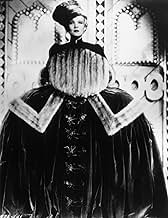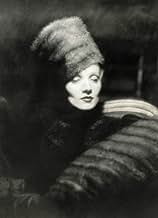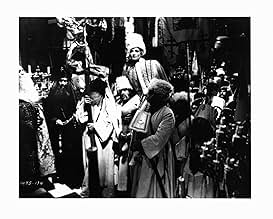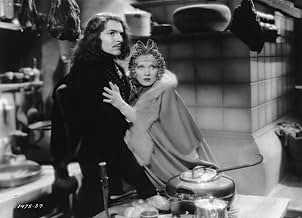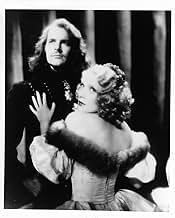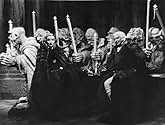Une noble allemande contracte un mariage sans amour avec l'héritier idiot et instable du trône de Russie, puis complote pour l'évincer du pouvoir.Une noble allemande contracte un mariage sans amour avec l'héritier idiot et instable du trône de Russie, puis complote pour l'évincer du pouvoir.Une noble allemande contracte un mariage sans amour avec l'héritier idiot et instable du trône de Russie, puis complote pour l'évincer du pouvoir.
- Director
- Writers
- Stars
- Prix
- 1 victoire au total
- Count Lestoq
- (as Phillip Sleeman)
- Ivan Shuvolov
- (as Hans von Twardowski)
- Sophia as a Child
- (as Maria)
- Lackey #5
- (uncredited)
- Count von Breummer
- (uncredited)
- Sophia's Aunt
- (uncredited)
Avis en vedette
Director Josef Van Sternberg, dubbed (correctly) "A lyricist of light and shadow" by one critic, proves this point in "Scarlet Empress" more than in any other of his films. Sternberg also knew he was losing Dietrich, and I like one scene where an actor is made up (from a side view) to resemble Sternberg. This actor is essentially the only one Marlene refuses her bed to, despite having no qualms about bedroom antics with half the Russian court. Sternberg projected himself into the role of Count Alexi, a character who has more screen time than anyone other than Dietrich. Alexi is teased by Dietrich and in the end he, um "doesn't get the girl." Sternberg knew he was no longer getting Dietrich and put this knowledge on celluloid with an awe-inspiring, even malicious fire. There are two things in this film which I really LOVE. The grotesque replicas which saturate the film are of course indicative of how the film will play out. The replicas, I suspect, were not easy or inexpensive to make--which makes them all the more fascinating, horrifying and MESMERIZING!
The background score. I have never seen a drama from the 1930s which used music more brilliantly than "Scarlet Empress." In a scene in a stable, when there is a chance that the two principals may make love, they are interrupted by the braying of a horse, which had been out of sight of the two. (According to many historians, this scene has much, MUCH deeper significance than it seems.) I cannot write what the historians have told to me on this board. It would be inappropriate. But before the horse neighs in that scene, Dietrich is twirling from a rope, and the music in the background lends immense eroticism to the scene, as does a straw which keeps going into and out of Marlene's mouth. The music combined with the beautiful lighting is stunning! There is also an opening torture scene which features a man swinging to and fro inside a huge bell, his head causing the bell to peal. Then, a quick dissolve to an innocent young lady who is flying high on her swing. THAT is a feat of genius!
If you can ignore some historical inaccuracies, which I suggest you do, and allow yourself to gorge on the beautiful lighting, music, as well as most scenes, I dare you to tell me that the film didn't MESMERIZE you! A TEN!
This pre-Production code film is a treasure throughout
The whole of the Russian court turns out to be not much different from the vile stories of atrocity she was narrated to as a child, one after another a series of machinations at the hands of the half-mad.
But of course history was never the purpose for Sternberg, these stories at the beginning of the film he visualizes in the manner of pages from a book. So a fiction malformed from history, a book of images, ostensibly based on the diaries of the real person, in turn a history malformed from the real thing, with Dietrich stage center, shining, radiant.
It was always Dietrich that validated film for Sternberg, the image of seductive beauty that could seduce beauty from the camera. But in several ways, I feel that Sternberg deteriorated upon joining up with her much like the hapless professor in Blue Angel. His art was tortured before, anguished with emotion, but since Dietrich it seemed to be solely consumed by her at the expense of all else.
Nowhere is this more evident than here, no pretense about it anymore. Dietrich is quite literally queen, destined to be, and the whole thing around her merely provides the tortured circumstances for the scene of triumph.
There is so much cacophony when she does finally triumph that it makes you think Sternberg has finally gone unhinged from so much pained adoration, that he doesn't quite know when to separate one feverish fantasy from his own. A cavalcade storms inside the palace and up the expansive staircase, a bell rings, ringing bells across the country, crowds rejoice, that were earlier silently praying, and Dietrich is finally ushered on shoulders into the church swarmed with banners on all sides to be crowned empress. Ride of the Valkyries clangs away in bombast for the duration.
But this is the thing that strikes the most vividly, the crowning luxurious decadence of the whole enterprise. Even in the grip of what seems like lovestruck paroxysm, Sternberg could envision farther than most at the time. And when he failed, he failed more spectacularly than anyone could, in the most interesting ways to see.
It baffles. It exhilarates with the sheer monstrosity of the caricature. It overwhelms any sensibility that is fine, any sense of good taste. You will never see more a outrageous depiction of an Orthodox church ever, the frescoes of saints bordering on a surreal that is blasphemous. Or more styrofoam gargoyles in one studio lot palace.
So the frame is overflowing with anguished, fiendish luxury; but everything that is grossly portrayed here, was actually taking place on that studio lot. Whatever was going on in 18th century Russia, at least this thing was actually happening in Hollywood, that would go to such lengths to envision and stage such a dazzling darkness. A cavalcade was made to storm up a staircase. And there was this woman at the center, flickering before the camera like the flame of the candle she holds at one scene, finally lighting up the place.
So it is apt to recast the whole thing as Dietrich's journey, mirrored from the other, from her faraway home into the court of a foreign country, with every spotlight on her, every male pair of eyes.
The first part is sourced out as a kind of Alice in Wonderland; the girl enters a strange world, apprehensive, fearful, a world that would reduce her to size, where she must fit through doors too big, wait for the queen or lose her head, finally descend into a rabbit hole and come out the other end the mother of a heir.
But in the second part she becomes the Dietrich we know and have come to see conquer with fierce beauty, the Lola that first broke hearts in Blue Angel; the whole film around her transforms into the restless dream that men were dreaming about her. The idea is that she becomes that dream, operating the image from inside.
It is not a good film all else considered, the overcooked bombast, the intertitles that never shy away from revealing the full implications of the most obvious detail, but it's a mess you should see, just for how madly passionate.
All this takes form and depth, is sculpted by director Sternberg's haunting lighting. It is "his" light, he lords over it, and with it anything is possible. He can make a face beautiful or ugly, innocent or evil. He can accentuate a certain side of a person's nature, or how a specific set piece relates to it, all with the proper illumination.
If his lighting is astounding, equally so is Sternberg's use of the visual motifs in his mise en scene (bells, veils, figures, specific set pieces, etc...) to transport the viewer back and forth through the film. For instance, the binding of Catherine and Peter's hands at their marriage is later echoed by an unquestionably similar knot Catherine ties in a napkin she is fondling, and then tosses onto the table of she and Peter's last meal together. The initiation of their marriage and the initiation of its end are in this way linked, and the audience is forced to take into account the changes in both their characters. Not only does the rhythm of these motifs remain figurative. The movement of the film takes on a distinct rhythm as well. A swinging motif is evident throughout, the bells, the incense burners, Catherine's swing, the hoopskirts, a baby's basket, and so on. In this the film takes the feel of a frenzied, but excellently choreographed dance.
But in all this there is one thing more noteworthy. Marlene Dietrich radiates! Quite possibly the most beautiful woman who ever lived, she begins innocent and virginal (seemingly intentionally melodramatically), standing out in a world of amorality. She is both the happiest and saddest point of the film. Her wedding to the vulgar Peter in an immense, yet claustrophobic cathedral is the most emotional part of the film. As it is filmed entirely in a series of close-ups of individuals, and long shots that blur their faces, there is no discernible eye connection between any of the characters. She is completely alone. As a voyeuristic camera cuts closer and closer to her trembling, veiled face, we suddenly feel the need to turn away. We know now that this last thread of decency is about to be crippled. Soon enough her innocence begins to fade before her sexuality, and the surroundings that once nearly suppressed her, she lords over, a queen of immorality.
"The Scarlet Empress" expresses the essence of film, and why it succeeds as an art form. It creates the possibility of a world almost wholly artificial, divorced from anything that ever was. It retains only fragmentary reproductions of something that existed in a pre-filmed state, combining and distorting them to effect something 90% fake. What's more that seems all it is interested in. No other artistic medium (aside from painting) is viewed worthy of its visuals, and all theatrical, literary, or other requirements are given little attention. They are flippantly thrown in only to please a narrow minded audience, and occasionally (but very, very rarely) to accentuate the films themes. Yet painting, ah yes, painting. That was a medium worthy of a brilliant visionary like Sternberg, and one he transferred to the screen with gusto. "The Scarlet Empress" is to Dali in its obsession with the bizarre, da Vinci in its detail, Picasso in its complexity of associations, but entirely Sternberg in its conception.
A riotous feast for the eyes, this is one of the great, unheralded films of the 1930's - enthralling for its visual impact alone. Seldom has an American film been filled with such lush imagery - tactile, grotesque, fascinating. The Russian royal palace is a charnel house full of ghouls & gargoyles - human & artistic. The actors share the scenes with fantastic statuary, twisting & writhing in silent, unspeakable pain. (Notice the tiny skeletons on the dining table.) Everywhere is death, moral decay & barbarism, even in the most powerful court in Europe.
At the center of this ossuary is the gorgeous Marlene Dietrich. Her beauty radiates, but never dominates, throughout the film. She is splendid as a young woman in a very dangerous place, who gains courage & great determination in her ordeal. Equally good is Sam Jaffe as Peter; with his leering grin & demented eyes he is the very picture of a murderous madman.
Louise Dresser, as the Empress Elizabeth, is very effective as a comic bully. John Lodge & Gavin Gordon, as Catherine's military lovers, are both stalwart. Wonderful old Sir C. Aubrey Smith has a small role as Catherine's princely father. Film mavens will spot an uncredited Jane Darwell as Catherine's nurse.
The highly emotional soundtrack, an amalgam of themes by Tchaikovsky, Mendelssohn & Wagner, explodes in the film's final moments into musical pyrotechnics.
In the first half Marlene Dietrich in the title role overplays breathless awe so emphatically that one can only wonder if she was strictly directed to do so; after her sexual awakening after months of resisting the stirring of her passions by a rakish courtier (John Lodge) and crazed with frustration by her unconsummated marriage to the repellent Tsar-to-be Peter (Sam Jaffe), she melts into the arms of a palace guard during a sudden moonlit encounter.
It's hard to believe this film passed the 1934 censors, given its open suggestions of out-of-wedlock sex (and subsequent pregnancy); Dietrich's posturings call to mind pre-Code Mae West (who was a friendly acquaintance of Dietrich's on the Paramount lot where they were working at the same time). Perhaps the keepers of the Code were too distracted by the shimmering vision of the blonde icon as lit by Josef von Sternberg. And make no mistake about it, this movie is a paean to Dietrich as a work of art. The "Catherine the Great" plot, scenic design and supporting players are the scaffolding and trappings supporting and surrounding the living goddess.
These trappings are highly stylized and elaborate as, for example, the Lubitsch-like ritual of Princess Sophia (the future Empress Catherine) kissing the hands of all adults present whenever she enters or exits a room; when she isn't engaged in strictly supervised activities she is kept locked in her bedroom several flights above the main floor of her house; her mother is such a disciplinarian that she scolds the child even when the child obeys. Empress Elizabeth of Russia (Louise Dresser) is introduced on a grand throne in forbidding surroundings decorated with huge grimacing gargoyles festooned with dripping candles and attended by over-dressed lackeys, only to open her mouth and jabber like a bilious small-minded housewife. And the future Tsar Peter whom Sophia is sent to Russia to marry is an imbecile and described as such repeatedly in intertitles in case we miss the point.
In fact the flow of exaggerations and extremes is more or less constant so that the viewer is alternately hypnotized and amused. If Dietrich is not your cup of tea, the movie will repel you, because it's all about her.
Le saviez-vous
- AnecdotesMarlene Dietrich's own daughter Maria Riva portrayed young Sophia at the beginning of the film and it was her debut in movies.
- GaffesMost of the action takes place at The Kremlin in Moscow. The historical Empress Elizabeth, Grand Duke Peter and later Catherine spent most of their reigns in St. Petersburg, which during the 18th Century was a modern, Europeanized city.
- Citations
Grand Duke Peter: Why are those bells ringing?
[He opens the bedroom door and addresses a man in the hall]
Grand Duke Peter: Why are those bells ringing?
Capt. Gregori Orloff: I don't know, Peter.
Grand Duke Peter: How dare you address me like that! Who are you?
Capt. Gregori Orloff: My name is Orloff, and I'm on duty as guard.
Grand Duke Peter: I'll have your head for this insolence! You're addressing the emperor!
Capt. Gregori Orloff: There is no emperor. There is only an empress.
- ConnexionsEdited from The Patriot (1928)
- Bandes originalesSymphony No.4 in F Minor, Op.36
Written by Pyotr Ilyich Tchaikovsky
Excerpts played during the opening credits and incorporated into the score often
Meilleurs choix
- How long is The Scarlet Empress?Propulsé par Alexa
Détails
- Date de sortie
- Pays d’origine
- Langue
- Aussi connu sous le nom de
- Catherine II
- Lieux de tournage
- société de production
- Consultez plus de crédits d'entreprise sur IMDbPro
Box-office
- Budget
- 900 000 $ US (estimation)
- Brut – à l'échelle mondiale
- 3 353 $ US
- Durée
- 1h 44m(104 min)
- Couleur
- Rapport de forme
- 1.37 : 1


